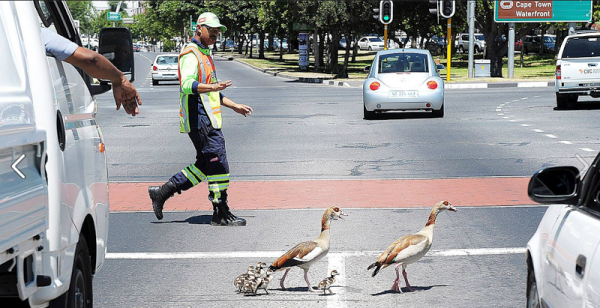15 February 2017

A Traffic Freeflow ‘pointsman‘ helps Egyptian geese and their goslings cross a busy Cape Town road.
Traffic Freeflow is an independent company that owns and manages the Pointsmen Project currently operating in the South African cities of Johannesburg, Cape Town and Tshwane.
Its aim is to alleviate road congestion by providing highly trained, dedicated and passionate men and women to help guide traffic.
Traffic Freeflow is said to be committed to being the most professional service provider for relief of traffic congestion in South Africa.
As well as contributing towards road safety, the company also creates job opportunities in underprivileged communities.
The project was introduced in 2005, and right from the outset it was co-sponsored by municipal authorities as well as insurance firm OUTsurance.
As a result, the pointsmen and pointswomen who bring relief to rush hour drivers have become locally known as the “OUTsurance guys”.
Thousands of motorists around South Africa have come to rely on the pointsmen of which there are two types: static and mobile.
Static pointsmen are assigned to specific high-traffic intersections, while mobile pointsmenare dispatched on motorcycles to traffic hotspots at a moment’s notice.
The latter are thus able to respond quickly to major intersections that are experiencing faulty or malfunctioning traffic signals.
Gauteng province (Johannesburg and Thswane) is one of the country’s highest traffic densities and consequently one of the highest road fatality rates. Construction, power outages and accidents have led to massive traffic congestion across the major cities.
Working hand-in-glove with their Metro Police stakeholders, more than 200 pointsmen are dispatched to troublesome intersections and hotspots.
“When traffic lights go out, traffic slows down and backs up,” said Traffic Freeflow COO John Kelley. “The pointsmen not only play a crucial role in getting traffic flowing, but as they are often at the same intersections during rush hours, motorists tend to become very fond of them and appreciate the good job they are doing.”
However, he went on to explain that the company’s six project managers would each have to drive to each assigned intersection in order to ensure attendance and that every pointsman was presenting themselves as brand ambassadors for the sponsors.
“We were unsure as to the time the pointsman started at the intersection, and if he/she stayed the full shift or, indeed, if they were at the correct place.
“Other issues included the costs of using six scooters per day, fuel costs and e-tags, and not the least, having our project managers in peak traffic hours twice a day, every day.”
Furthermore, Kelley wanted to be sure the staff were being paid correctly according to the hours worked.
As a result, the company needed to know that the pointsmen were in the right place at the right time, how long they were there, and also check times and attendance back at its offices.
It called upon ECONZ Wireless, the South Africa-based specialist in hosted enterprise mobility applications, and deployed its innovative Econz Timecard system.
The solution provides data about the pointsmen, such as the time the arrived for work and departed, their GPS location, and a breadcrumb trail, all captured in a web-based system. ECONZ says Timecard enables real-time tracking so that project managers can be sure that the correct intersections are manned.
The data collected also integrates into Traffic Freeflow’s payroll system to ensure wages for time spent are accurate.
“Timecard sits right on [the pointsmen’s] cellphones and allows them to quickly clock in, and thus they can be tracked at all times,” said Kelley.
“We have reduced the need for physical checks by our project managers, thus saving time, costs of the running of the scooters, and keeping our project managers safely out of the rush hour traffic. Now we have visibility at the enterprise level to and know who is where and when they arrive and leave.”







